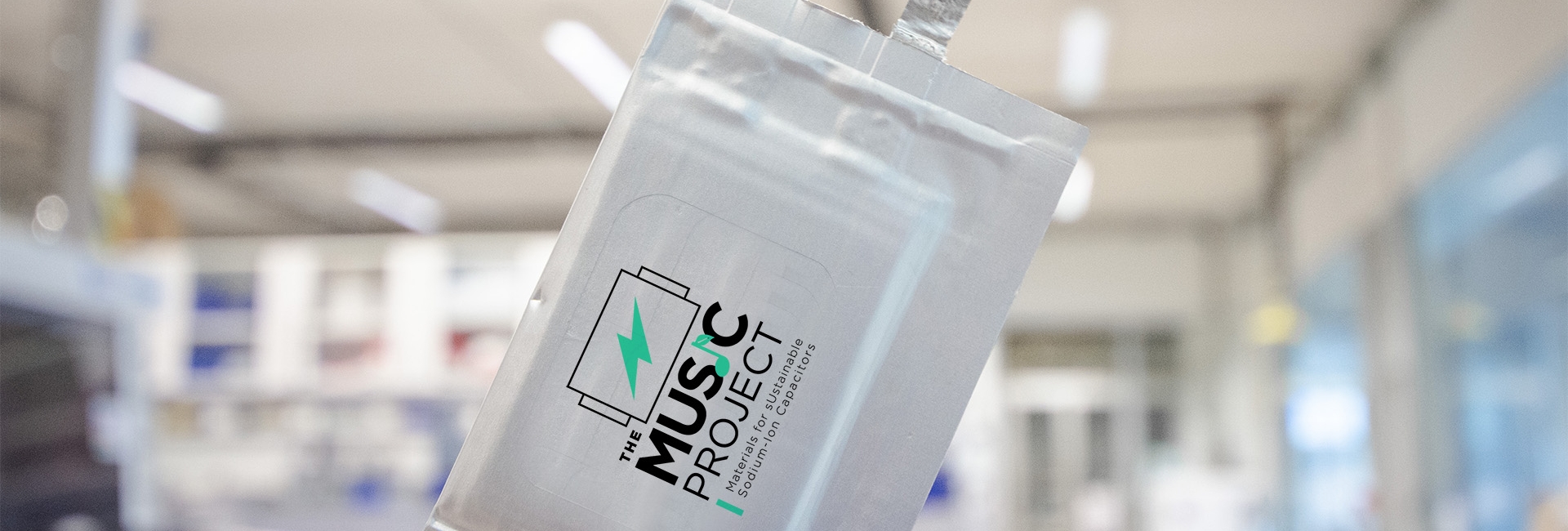
Technical approach
The MUSIC Project proposes a disruptive technology to design sodium-ion capacitors cells with gravimetric energy and power of at least 40 Wh/kg and 10 W/kg and over 100k cycles, enabled by a solution-processable, air-stable, low-cost presodiation strategy.


The MUSIC Project´s methodology consists of a series of R&D activities with the objective to develop a 12V module, built with SIC cells assembled in an industrial manufacturing pilot line incorporating advanced sensing by the end of the project. Such activities begin with the synthesis of key raw materials for the SICs that will be optimized to obtain high performance lab-scale devices and further upscaled to final prototypes incorporating an innovative supercapacitor management system. Finally, Life Cycle Assessment and Life Cycle Cost studies will help to asess the environmental and economic sustainability of the final product.
The overall methodology of the MUSIC Project comprises three phases:
- Phase I: Development, characterization, and upscaling of advanced materials.
- Phase II: Development of manufacturing processes, prototypes and fabrication of 1000 Farad SIC cells.
- Phase III: Development of 12V module with integrated SMS, validation and Life Cycle Assessment.

Novel Sustainable Materials
- High capacity activated carbon (70 mAh/g)
- Fast rate carbonaceous negative electrode (150 mAh/g at 10C)
- F-free aqueous procesable binders
- Green electrolytes (>5V and 10 mS/cm)
- High capacity pre-sodiation agent (>500 mAh/g)
- Advanced operando characterisation techniques

Cell production
- Aqueous processing/dry processing
- Ink formulation and scale up
- Pilot line production of electrodes
- Cell assembly and pre-conditioning
- Testing/Ageing
- Cell target characteristics
- 40-45 Wh/kg and 55-60 Wh/L
- >10 kW/kg and >10 kW/L
- Charge time 10s (SoC 100%)
- Cell voltage 2-4.2V
- 100k cycles at high rates

Modules & End-user applications
- Development of innovative Supercapacitor Management System (SMS)
- Monitoring of SoC, SoP and SoH of individual cells
- Module production and cell balancing
- Validation under und user specifications
- Life Cycle Sustainability Analysis
- Second Use and Recycling
APPLICATIONS
The high-energy and high-power density of MUSIC sustainable sodium-ion capacitors together with its long cyclability will help transform passenger electromobility (e-buses, trams), hydrogen mobility (heavy vehicles, trains, trucks, aviation) and reinforce renewables (harvesting, power electronics)

Electromobility
Electrification is already being widely implemented for passenger cars. Passenger transport (e-buses, trams) will strongly benefit from the novel SIC technology as kinetic energy recovery system and power supply for start-up and acceleration

Hydrogen Mobility
Fuel cell vehicles (FCV) that generate electricity from hydrogen and oxygen are expected to be the future solution for heavy vehicles (train, trucks, aviation). SICs are the perfect partnership for FCVs as a high output auxiliary power supply since it presents high-rate current input/output characteristics, long life and safety

Renewable Energy
SICs will contribute to higher shares of renewables by buffering high wind peaks or low sunlight conditions that switches off inverters/batteries owing to current oveloads or lying below voltage thresholds that disconnect generation from storage. SICs will also ensure grid stability as primary frequency control or short duration back-up.